In times of crisis, people seek the unifying and comforting power of music to ease the collective pain of the nation. With coronavirus fears, it’s time to turn to music once again!
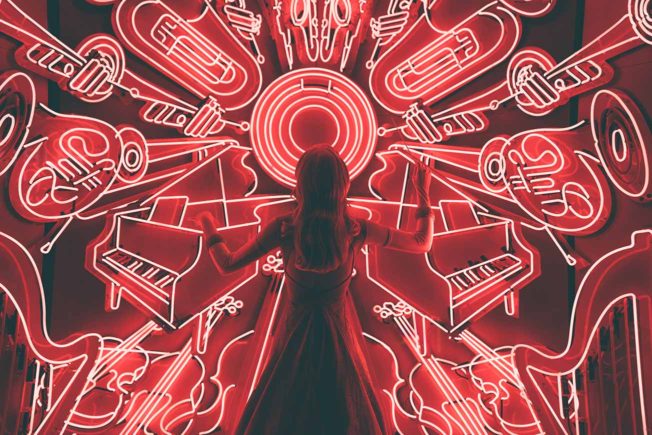
How Music Can Change the World
Music can change the world.
This quote came from Ludwig Van Beethoven, who was alive from 1770 to 1827. But in reality, those five words were likely spoken, written, and otherwise communicated for hundreds of years before that for one simple reason:
They are completely and utterly true. They are factual, indisputable, unbent, and unbroken.
Music can change the world. It has changed the world and will continue to change the world. But music only changes the world when the world needs changing; when times are tough, and right now, times are tough.
The coronavirus is officially a pandemic, meaning it’s a global issue. That means the world needs great music now more than ever, and you can be the one to provide it.
With the advance of technology, it has never been easier to produce excellent music from home and subsequently share it. For example, Billie Eilish and her brother Finneas made their Grammy-winning debut album together in Billie’s bedroom. If they can do it, so can you!
What matters when producing music that speaks to a broader audience is tapping into the creative processes that unite all humans. Whether you’re sitting in a multimillion-dollar studio or your bedroom, it doesn’t make a difference.
We are all creators. We also have the same ability to open ourselves up to the flow of creativity and then manifest that creativity as music.
Times of struggle are opportunities to produce great art because they unite us in another way. They unite us in our emotions and our feelings.
It’s unfortunate, but stress, fear, and uncertainty exist within every human being right now. Great artists follow these feelings and say what others fear to say.
You are your own worst enemy in the studio. Learning to let the flow of creativity express your authentic feelings is the only way anyone can connect with music when it’s real.
How Coronavirus Affects Music Culture
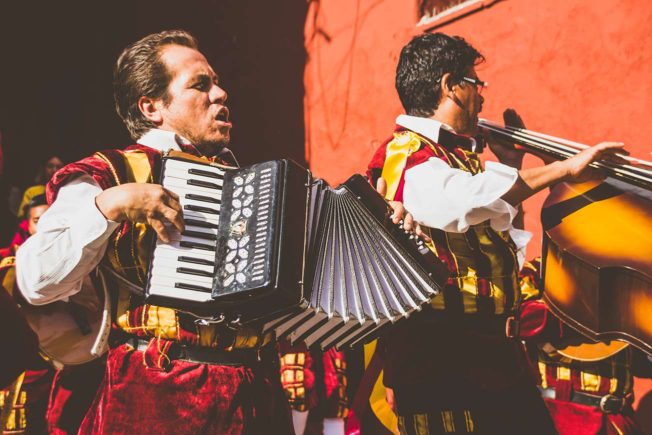
Music culture is feeling the effects of this pandemic more than any other culture. Venues are forced to close, festivals postponed, and worldwide tours canceled. Worst of all, people who rely on income from these exploits are essentially out of a job. Many people are also literally out of a job because of it.
The days ahead will be hard for the world of music. But every musician who uses their art to express their true feelings and say what matters makes it much easier for everyone. Music can make the world much brighter by demonstrating no one; not one person is alone.
For the challenging roads that lie ahead in the music industry, there are equal opportunities. There are more people in the world than ever at home, on the internet, and actively seeking new music.
People make lifelong connections with artists or albums during significant moments in their own life. What can be more significant than those quarantined during a worldwide pandemic?
Across the evolution of music, there have been periods widely accepted to have produced the best music in history. But they all coincide with periods of great struggle. This phenomenon happens during these times because people need a reminder they’re not alone.
Music and The Great Depression
![]()
Between 1929 and 1939, the entire world went through what is now universally known as the Great Depression. Nations were on the verge of total collapse, and it was impossible to find work. People were also forcibly removed from their homes. Parents even abandoned their children because they couldn’t support them.
With things so dismal, music was the one outlet of hope. By the late 1920s, jazz became the popular music of choice. The progression of jazz during that time also set dancing trends.
According to many who lived through the Depression, you can’t be sad and dance at the same time. Music and dancing made people forget the hardships of daily life. Claudia Reinhardt and Bill Ganzel
Before the Great Depression, jazz was still primarily focused on instrumental virtuosity. The genre was young, and the sheer ability of the musicians intrigued spectators. But once the quality of life descended, they needed something more active and visceral, something that provided a true release.
That’s when styles like swing and big band came into the forefront. Canonized legends such as Duke Ellington, Benny Goodman, and Count Basie lead the way. The incredible musicianship was still there but with an extra sense of fire – a fire that made people want to move. And move they did!
Not only did the music quell growing social tensions surrounding the Great Depression, but it also helped break racial barriers. Black musicians and white musicians were suddenly playing together, traveling together, and writing together.
They were united by a desire to make the world brighter in times of darkness. This trend continued into the 1960s until the early 1970s, another important time for both music and the world.
Music and The Civil Rights Movement
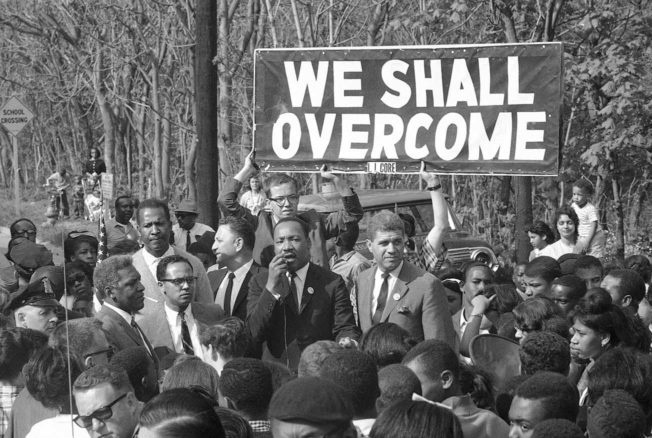
The Civil Rights Movement and the Vietnam War were happening simultaneously.
In the United States, Dr. Martin Luther King Jr. and Malcolm X became symbols of hope for disenfranchised people. They rose against the status quo while being met with militaristic resistance from the government and white communities.
Abroad, American soldiers were sent against their will into an unjustified and unwinnable war. Those fortunate to come back were permanently damaged from what they saw and had to do.
People needed something to believe in, something to unite them. Once again, they turned to music. And from this era rose some of the most prominent musicians in history.
By the early 1960s, the Civil Rights Movement was at its apex in both horror and progress. Activists like Medgar Evers and Herbert Lee were assassinated with impunity, while Ruby Bridges was breaking the segregation barrier in schools.
This surging support and opposition to the Civil Rights Movement culminated in “The March on Washington for Jobs and Freedom” in August 1963. It was at the destination of this march where Dr. King delivered his immortalized “I Have A Dream” speech on the steps of the Lincoln Memorial.
It was also where Dr. King shared the stage with Bob Dylan and Joan Baez to perform “When The Ship Comes In” in front of nearly 300,000 people.
All those people were there for the same reason. They believed that despite the uncertainty of the times, humans could change the world when they unite. The march became a symbol for human unity, which led to the Civil Rights Act of 1964 and the Voting Rights act of 1965. Both signed into law by President Lyndon B. Johnson.
Music and The Vietnam War
![]()
Today, everyone knows Bob Dylan. His music is synonymous with social progress. In the early 1960s, before the shock and awe of integrating electricity into the guitar, acoustic folk music musicians like Dylan drove the conversation.
It was Dylan’s use of metaphor and allegory as opposed to overt references that made people realize these problems aren’t racial. They’re human problems, and people of all races, religions, and backgrounds needed to unite to solve these problems.
Later in the decade, humans once again united through music to end the Vietnam War. This time with the help of distortion.
As Bob Dylan was propelling the Civil Rights Movement, people were also consuming his music for pleasure. His sound reached more ears, and more hearts than any popular music had before. It also inspired dozens of new musicians and advanced musical evolution at a rate unseen since the dawn of the internet.
New styles surrounding the guitar-driven format were also flourishing, eventually combining into what’s known as rock and roll. Considering the spirit of protest imbued into the genre’s legacy, rising rock musicians (and their legions of followers) took on the Vietnam War full throttle.
The Civil Rights Movement also proved rebellion and music could lead to positive change. And the sheer intensity of the music coming out in protest of the Vietnam War reflected that understanding.
Jimi Hendrix. The Jackson 5. The Doors. Creedence Clearwater Revival. The Rolling Stones.
These acts and more contributed their music to end the conflict in Vietnam. Most notably, Hendrix played his solo-rendition of “The Star-Spangled Banner” during his Woodstock performance in 1969. It became a symbol of music’s effect on culture.
![]()
Pop critic Al Aronowitz of the New York Post wrote: “It was the most electrifying moment of Woodstock, and it was probably the single greatest moment of the sixties.”
Hendrix never admitted he performed the anthem as a protest against Vietnam. Still, its effect took Hendrix to a new platform of reverence, a platform he would use to speak out against the war through songs like his 1970’s “Machine Gun.”
Music and the Kent State Massacre
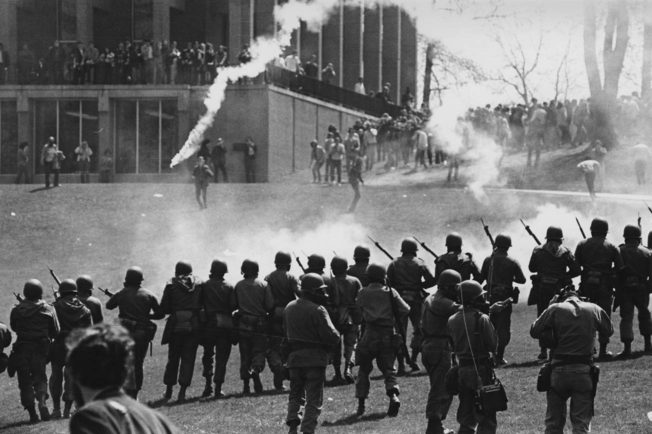
1970 was also the same year of the Kent State Massacre. The National Guard shot and killed four unarmed college students during an anti-war protest at Kent State University in Ohio.
An event now cemented in history; the already passionate community of musicians became justly harrowed by this tragedy. It took to the stage with unprecedented vigor as the violence of Vietnam moved to the streets of America.
Songs like Neil Young’s “Ohio,” Black Sabbath’s “War Pigs,” and John Lennon’s “Imagine” came to fruition following what happened in Kent State. These songs and others ignited a sense of unity among the war opposition, which concluded with the withdrawal of U.S. troops from the region.
Fueled by struggle, this period of rock and roll withstood the test of time, unlike any other era in music. The kind of unavoidable, unrelenting conflict the world hasn’t seen since… until now.
Comparing a pandemic to war, a struggle for social equality to a period of economic collapse might seem flippant. Ethicists can debate which of those was worse for humanity overall.
The World Needs to Pay Attention
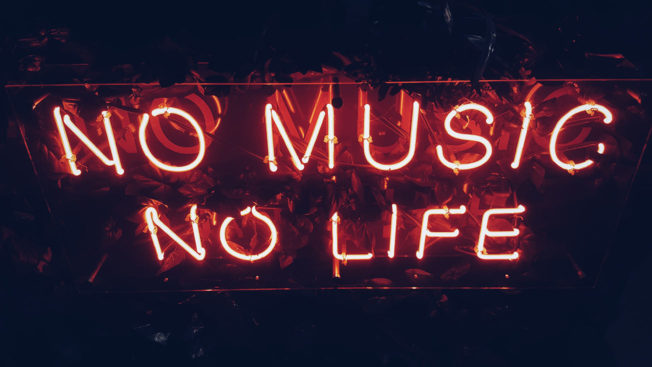
What unites the coronavirus pandemic with these struggles is that it’s making the entire world pay attention.
Since the Great Depression, the Civil Rights Movement, and the Vietnam War, society has faced similar struggles. Knowing we’ve come out stronger from those struggles makes the crises that followed easier to dismiss.
That’s not to say we should dismiss them, but their familiarity is what makes them dismissible. Dave Chappelle said during his special at the Hollywood Palladium, “it’s easier than ever to adopt the mentality that these things aren’t a concern.”
Well, this virus concerns everyone on the planet. Never in the modern era has a pandemic affected humanity like this. For a while, everyone will have to adjust for the good of the human race.
We will need to unite to overcome this, and we will need music to do that. Whether we need it to distract from struggles, to inspire work towards change, or as a reminder this predicament will end.
Either consciously or unconsciously, people are hungry for the next big thing in music. Why can’t that big thing be you? Or you and a friend?
The best thing the internet did was connect humans. Use that connection in the best way possible. Use it to fuel your creativity, and one day your name may join the ranks of Bob Dylan and Jimi Hendrix as era-defining.
Greatness is within reach. Greatness is within. Are you willing to tap into the world around you, and more importantly, tap into yourself?